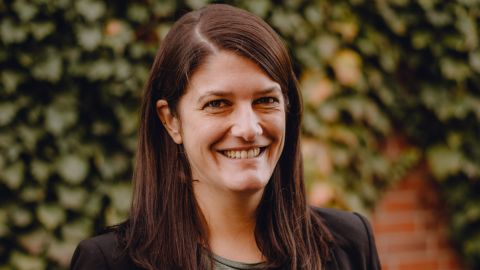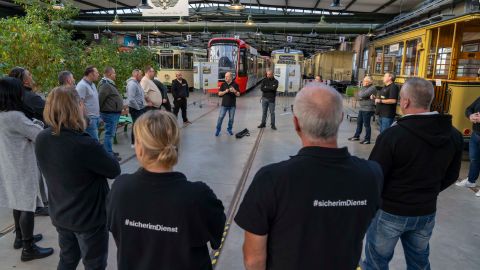Violence against emergency services is not a new issue for the police. The state monopoly on the use of force is confronted with it as part of its job. Today, violence in the public sector takes place everywhere: in city councils, hospitals and schools or in the emergency services. What can be done about it? The assignment for the NRW police came from politicians: to draw up guidelines for the protection against violence. The police developed the idea further - into a successful campaign of astonishing proportions.
Anne Herr is 36 years young, has a degree in psychology and is also a passionate emergency paramedic. She has a background in violence research and heads the staff unit of the #sicherimDienst state initiative at Münster police station. Chief Superintendent Ralf Hövelmann (60) is a real police officer. Having learned the ropes from the bottom up and with experience in the riot police, he knows what it means to experience violence. Today, he does professional public relations work for #sicherimDienst. Police Senior Councillor Andre Niewöhner is someone who keeps in touch with the country. Together with two other employees, they are the control center of #sicherimDienst and thus responsible for a network of 850 authorities and institutions with over 2,300 multipliers.
How did such a network come about in just a few years? "Violence research has long been a topic that has occupied me intensively, and not just from an academic perspective," says Anne Herr about her path to #sicherimDienst. "In my part-time job as an emergency paramedic, I look through a second pair of glasses. The insights are shocking. Experiencing violence is part of everyday life today." In 2021, she wrote directly to Interior Minister Herbert Reul as part of a scientific project to encourage him to get involved. And was confronted with an idea from the NRW state government. "Andre Niewöhner from the Münster police force had been commissioned to develop a guide for public service employees. I was immediately on fire for the idea." The idea became a project. And it was not satisfied with this assignment. "A guide was not enough for us," explains Andre Niewöhner. "We wanted something substantial. There were some practical examples that we wanted to pass on to others. That's how the idea for the network came about. And once we had initiated it, it grew rapidly. More and more authorities, more and more people registered their needs, became part of the network and began to share information and best practices."
"While we had to deal with a flood of registrations from police authorities, district governments, cities and municipalities, hospitals and schools in the first few months, the focus today is on active networking," says Ralf Hövelmann, explaining the work of #sicherimDienst. There are now preventative measures, recommendations for action, further training, aftercare options and specific advice in problematic individual cases.
In the meantime, the network is present on an incredible number of stages: violence prevention in hospitals, structural and technical measures in municipalities to prevent violence, protection of political activists from violent attacks or assistance for employees of the judiciary who are experiencing more and more violence in their everyday lives. These are just a few examples. "Never in our wildest dreams did we expect the work in the network to be characterized by so much good content, so much substance," says Hövelmann, describing the situation. He illustrates this with a practical example: "In preparation for the European Football Championship, we carried out situation training for bus and train drivers and passenger attendants with the NRW transport companies. Very practical in buses and trains. The participants also developed training concepts for their own transport operations. This was a great success, from which the participants are sure to benefit in the long term."
There is also something pragmatic about #sicherimDienst. "Our pocket cards with prevention tips for different professional groups are very popular and really make sense," confirms Hövelmann. Among other things, the cards are available specifically for the safety of elected officials and employees in public transport or at Straßen NRW.
"It is impressive how the network continues to grow beyond the borders of NRW. We are delighted about this. Every new institution is a gain and strengthens the network. For the safety of employees in the public sector," says Andre Niewöhner.
#sicherimDienst deals with a socially enormously relevant topic and hits the nerve of the times. Ultimately, it's about people's trust in the state. As long as the polarization in our society continues, as long as we fail to restore trust in the state, #sicherimDienst will have an enormous amount of work to do.


